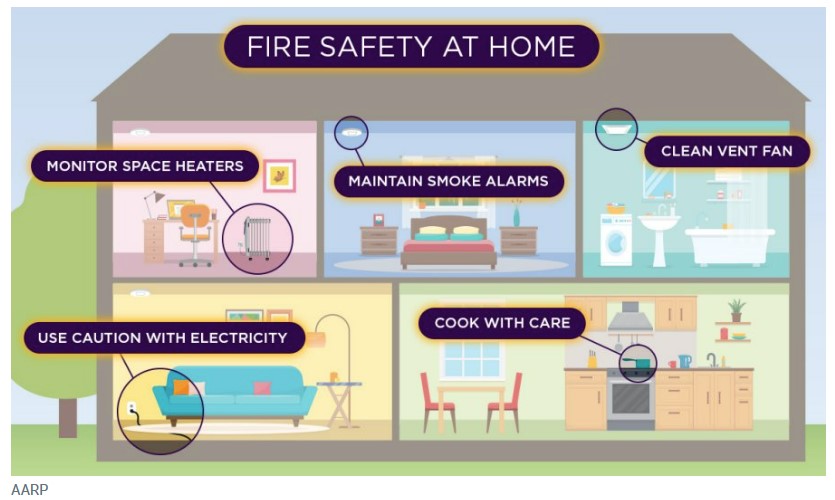
Fires are unpredictable and can cause serious damage to rental properties. As a property owner, it’s important to be aware of the common fire hazards that exist in your rental units and take steps to reduce the risk of a fire breaking out in your home. In this blog post, we’ll look at 10 common fire hazards in rental properties and how you can prevent them.
1. Faulty Electrical Wiring – Faulty electrical wiring is one of the leading causes of fires in rental properties. To prevent this from happening, make sure all wiring is up to code and regularly check for frayed or exposed wires. Additionally, make sure all outlets have covers and that extension cords aren’t being used for long-term solutions.
2. Overloaded Outlets – Overloaded outlets are another common cause of fires in rental properties. To prevent this from occurring, make sure not to overload any outlet with too many plugs or appliances at once. If necessary, consider installing additional outlets or using power strips instead of plugging multiple items into one outlet.
3. Space Heaters – Space heaters can be dangerous if they are used improperly or if they become overheated due to overuse or clogged vents. To reduce the risk of a fire caused by a space heater, make sure renters understand how to use the heater correctly and periodically inspect it for signs of wear and tear such as clogged vents or charred casings around the heating element.
4. Cooking Equipment – Unattended cooking equipment is another common cause of fires in rental properties. Make sure renters understand that they should never leave cooking equipment unattended while it is on and that they should always turn off burners before leaving the kitchen area after cooking meals.
5. Candles & Incense – Open flames from candles, incense sticks, etc., can lead to house fires if left unattended or placed too close to flammable material such as curtains or furniture fabric. To reduce the risk of a fire caused by an open flame, make sure all renters understand not to leave candles burning unattended and that incense sticks should never be burned near flammable materials such as curtains or furniture fabric.
6 Clutter & Obstructions – Clutter and obstructions can be major contributors to house fires if left unchecked for too long; clutter can quickly become combustible material when exposed to sparks from electrical appliances or open flames such as candles or incense sticks while obstructions can block exits during a fire emergency making it difficult for people inside the home to escape safely. To reduce these risks, ensure that all renters keep their living spaces tidy by discarding unnecessary items quickly and keeping pathways clear at all times so that everyone has easy access out during an emergency situation.
7 Smoking Materials - Cigarettes are one of the leading causes of house fires; these types of fires often occur because smokers throw their cigarettes onto flammable material like rugs, couches, bedding etc., which can quickly ignite when exposed to heat from discarded smoking materials. To reduce this risk remind all renters not smoke indoors and always discard smoking materials properly outside away from any potential sources of ignition.
8 Appliances - Old appliances may still function correctly but may be more susceptible than newer models due to aged wiring; when wires become worn out they may spark which could ultimately lead to an electrical fire. To prevent these types of accidents replace older appliances with newer models whenever possible but also remember that even newer appliances need regular maintenance checks so schedule these accordingly with your tenants.
9 Natural Gas Leaks - Natural gas leaks can cause devastating explosions if left unchecked; these types of accidents often occur due to faulty pipes/fittings which allow natural gas vapors accumulate without being noticed until its too late. To minimize this type of danger require regular inspections on any natural gas piping throughout your rental property as well as teach tenants how recognize warning signs associated with gas leaks (i .e . odd smells) so they report them promptly.
10 Poor Ventilation - Poor ventilation is another major contributor toward house fires because inadequate circulation allows combustible material like dust particles accumulate around electric sockets/appliances which could spark during operation thus creating potential sources for ignition. Make sure there is plenty air circulation throughout each room especially near electric sockets/appliances so combustible material does not accumulate over time otherwise you increase chances having an unexpected house fire break out unexpectedly.
Fires are unpredictable but taking proactive measures like identifying common fire hazards within your rental property will help protect both you tenants alike against unnecessary tragedies. Be vigilant about inspecting each unit routinely look out warning signs any potential sources ignition so that you minimize risks associated with sudden unplanned housefires. By following these tips along conducting regular maintenance checks on electrical wiring/outlets plus teaching tenants proper safety precautions when dealing open flames (candles incense etc.) you will greatly reduce chances having unexpected disasters within your rentals. Happy renting!

